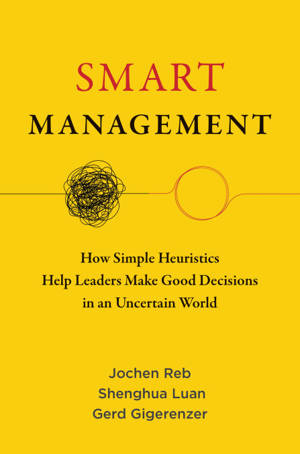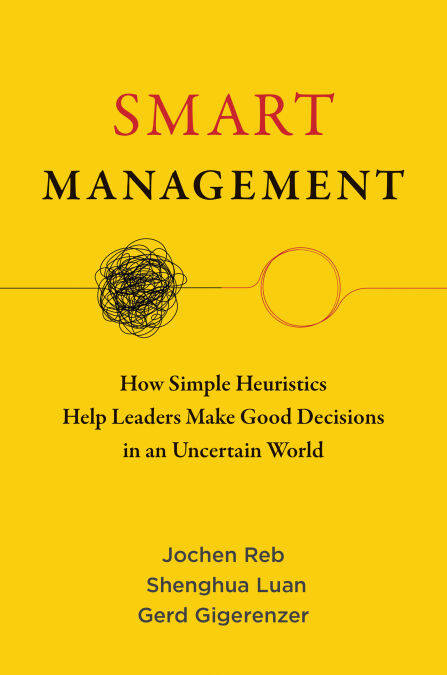
- Afhalen na 1 uur in een winkel met voorraad
- Gratis thuislevering in België vanaf € 30
- Ruim aanbod met 7 miljoen producten
- Afhalen na 1 uur in een winkel met voorraad
- Gratis thuislevering in België vanaf € 30
- Ruim aanbod met 7 miljoen producten
Zoeken
Smart Management E-BOOK
How Simple Heuristics Help Leaders Make Good Decisions in an Uncertain World
Jochen Reb, Shenghua Luan, Gerd Gigerenzer
E-book | Engels
€ 44,35
+ 44 punten
Omschrijving
Why successful leaders must embrace simple strategies in an increasingly uncertain and complex world.
Making decisions is one of the key tasks of managers, leaders, and professionals. In Smart Management, Jochen Reb, Shenghua Luan, and Gerd Gigerenzer demonstrate how business leaders can utilize heuristics—simple decision-making strategies adapted to the task at hand. In a world that has become increasingly volatile, uncertain, complex, and ambiguous (VUCA), the authors make the case against complex analytical methods that quickly reach their limits. This against-the-grain approach leads to decisions that are not only faster but also more accurate, transparent, and easier to learn about, communicate, and teach. Smart Management offers an evidence-based yet practical discussion of how business leaders can use smart heuristics to make good decisions in a VUCA world.
Building on the fast-and-frugal heuristics program, Smart Management demonstrates the efficacy of heuristic decision making in a twofold approach. First, it introduces the concept of ecological rationality, which prescribes the environmental conditions under which specific heuristics work well. Second, the book describes a repertoire of heuristics, referred to as the adaptive toolbox, that leaders, managers, and professionals can develop and rely on to make a variety of decisions, such as on business strategy, negotiation, and personnel selection. The toolbox not only showcases the practical usefulness of these heuristics but also inspires readers to discover and develop their own smart heuristics.
Making decisions is one of the key tasks of managers, leaders, and professionals. In Smart Management, Jochen Reb, Shenghua Luan, and Gerd Gigerenzer demonstrate how business leaders can utilize heuristics—simple decision-making strategies adapted to the task at hand. In a world that has become increasingly volatile, uncertain, complex, and ambiguous (VUCA), the authors make the case against complex analytical methods that quickly reach their limits. This against-the-grain approach leads to decisions that are not only faster but also more accurate, transparent, and easier to learn about, communicate, and teach. Smart Management offers an evidence-based yet practical discussion of how business leaders can use smart heuristics to make good decisions in a VUCA world.
Building on the fast-and-frugal heuristics program, Smart Management demonstrates the efficacy of heuristic decision making in a twofold approach. First, it introduces the concept of ecological rationality, which prescribes the environmental conditions under which specific heuristics work well. Second, the book describes a repertoire of heuristics, referred to as the adaptive toolbox, that leaders, managers, and professionals can develop and rely on to make a variety of decisions, such as on business strategy, negotiation, and personnel selection. The toolbox not only showcases the practical usefulness of these heuristics but also inspires readers to discover and develop their own smart heuristics.
Specificaties
Betrokkenen
- Auteur(s):
- Uitgeverij:
Inhoud
- Aantal bladzijden:
- 272
- Taal:
- Engels
Eigenschappen
- Productcode (EAN):
- 9780262378567
- Verschijningsdatum:
- 13/05/2024
- Uitvoering:
- E-book
- Beveiligd met:
- Adobe DRM
- Formaat:
- ePub

Alleen bij Standaard Boekhandel
+ 44 punten op je klantenkaart van Standaard Boekhandel
Beoordelingen
We publiceren alleen reviews die voldoen aan de voorwaarden voor reviews. Bekijk onze voorwaarden voor reviews.







